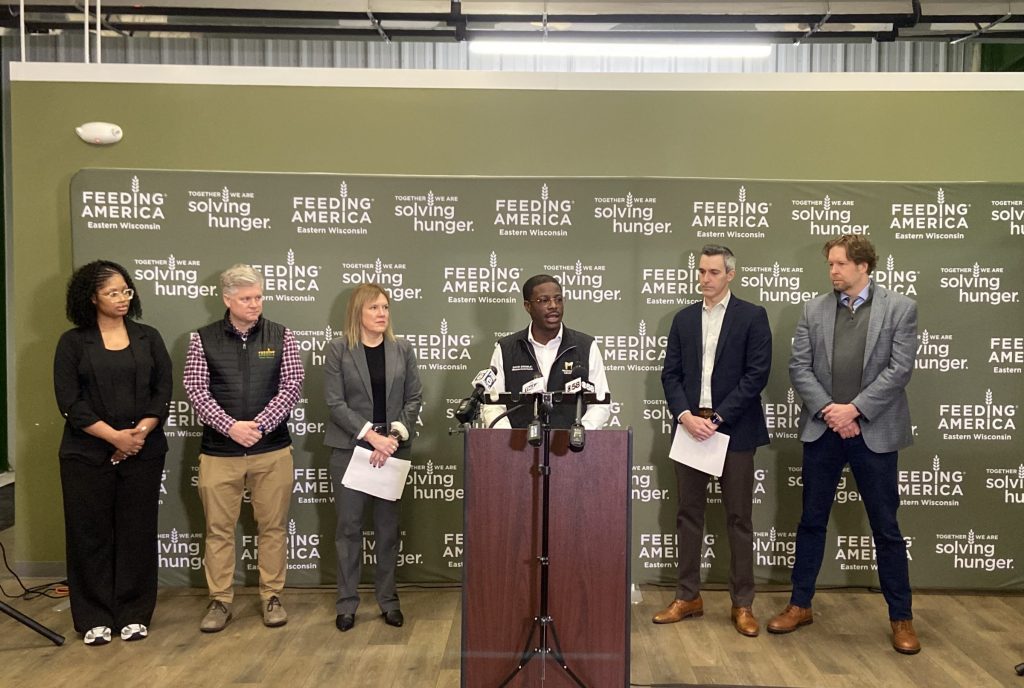Officials Call On Feds — Don’t Take Away Food Aid
SNAP pause and future cuts to it in 'One Big Beautiful Bill' hurt people, they warn.

(Left to right) Bianca Lewis, Matt Stienstra, state DHS Sec. Kirsten Johnson, County Executive David Crowley, Dr. Ben Weston and Christopher Simenz. Photo taken Nov. 25, 2025 by Graham Kilmer.
In the wake of a food assistance crisis precipitated by the recent federal government shutdown, state and local officials are calling for protection and increased funding for food aid programs.
During an event at Feeding America Eastern Wisconsin Tuesday, County Executive David Crowley called on Congress and President Donald Trump‘s administration to ensure food share benefits are protected and to increase funding for the program. He was joined by Wisconsin Department of Health Services Secretary Kirsten Johnson called federal food assistance a “critical program” for combatting food insecurity.
On Nov. 12, the longest federal government shutdown in U.S. history ended. The Supplemental Nutrition Assistance Program (SNAP) became a casualty of the shutdown fight between Republicans and Democrats in the U.S. Senate. The program was on track to run out of funding without a congressional funding appropriation, and the Trump administration refused to use emergency funding to keep benefits available.
When a federal judge ordered the administration to fully fund SNAP, Gov. Tony Evers quickly authorized benefits for Wisconsinites receiving assistance under FoodShare, the name for Wisconsin’s SNAP funded food program. Approximately 700,000 people in Wisconsin use FoodShare to help them purchase food.
“I never imagined, in my career, that we would be fighting for people to have access to food, and that an administration would take away people’s access to the very resource that people need to live the healthiest lives,” Johnson said.
Crowley said the federal shutdown revealed how “vulnerable” programs like SNAP and Meals on Wheels are to the “actions or inactions of leaders in Washington D.C.” Before the shutdown almost wiped out a month of food assistance in Wisconsin, one in four children in Milwaukee County were experiencing hunger.
“We saw this issue exacerbated during the shutdown,” Crowley said.
Food Banks and local governments in Milwaukee were preparing for the lapse in food assistance, stocking up on food and running emergency food drives. The county worked with the City of Milwaukee and other organizations on a food drive that raised more than $92,000 and collected more than 9,000 pounds of food, Crowley said.
SNAP funded programs, however, remain the most important tool for combatting hunger. In Wisconsin, FoodShare remains the “bedrock” for anti-hunger efforts, said Matt Stienstra, director of advocacy and engagement for Feeding America Eastern Wisconsin. In October, as families prepared for an impending lapse in food assistance, they flocked to local food pantries. Stienstra said the pantries in their network saw an 80% increase in demand.
Hunger and food instability have a direct impact on health outcomes and education for children, and the social and emotional health of families, said Dr. Ben Weston, chief health policy advisor for Milwaukee County. “Food insecurity is not simply the absence of food, it’s the presence of that stress — constant and relentless stress,” he said.
Bianca Lewis testified to the painful experience of hearing their child tell them they are hungry while there is no food for them. She called for greater community action on food insecurity; “Because it might not be you today, but it could be you tomorrow.”
The shutdown elevated SNAP funding as a social and political issue for millions of Americans, but the end of the shutdown is not the end of food-aid political battles in the U.S. The Republican-backed omnibus legislation passed by Congress earlier this year, called the One Big Beautiful Bill Act, included the largest cuts to SNAP in the history of the program. Over 10 years, the program will be cut by approximately $186 billion and millions of people will lose access to food assistance.
Congressional Democrats have proposed legislation aimed at reversing the SNAP cuts, and Crowley urged county residents Tuesday to call their congressperson’s office to advocate for protecting and increasing SNAP funding.
The holidays are a great time for people to get involved in their community and donate their time or money to tackle food insecurity, the county executive said. But long-term, he said, the federal government needs to “really step up and tackle the issues.”
If you think stories like this are important, become a member of Urban Milwaukee and help support real, independent journalism. Plus you get some cool added benefits.
Political Contributions Tracker
Displaying political contributions between people mentioned in this story. Learn more.
- September 18, 2015 - David Crowley received $25 from Matt Stienstra
- August 18, 2015 - David Crowley received $25 from Matt Stienstra
- July 18, 2015 - David Crowley received $25 from Matt Stienstra
MKE County
-
Chief Judge Questioned About ICE Policy, Texts, Emails in Dugan Trial
 Dec 17th, 2025 by Graham Kilmer
Dec 17th, 2025 by Graham Kilmer
-
Fellow Judge Testifies in Dugan Case
 Dec 16th, 2025 by Graham Kilmer
Dec 16th, 2025 by Graham Kilmer
-
Key Questions in Dugan Trial Take Shape on First Day
 Dec 15th, 2025 by Graham Kilmer
Dec 15th, 2025 by Graham Kilmer




















